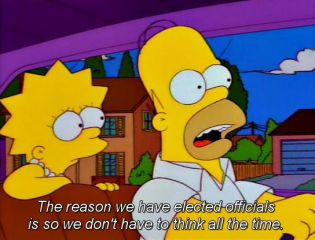
There are only two days left until the referendum and the polls are neck and neck to an even greater extent than during the Scottish IndyRef. Unlike in that referendum, someone has stupidly decided to give me a vote this time around and I’m intending to wield it with all the subtlety of Prince Phillip on a foreign visit.
I have no great love for the European Union, all too often it is bureaucratic, overbearing and leeches sovereignty away from national governments, striving to become a federal government against the will of it’s people.To suggest otherwise is nonsense, the founding principle of the organisation was and still is to an extent, ever growing integration. Nor do I feel a particularly close affinity in cultural terms to our European neighbours, as a nation Britain is culturally closer to our cousins in Canada, Australia, New Zealand and the United States than we will ever be to Poland or Slovakia or Greece. However for the reasons below I’ve come to the opinion that to vote to leave is too risky and contains too many unknowns to make it the sensible decision.
Perhaps I’m talking crap and perhaps I have too much free time on my hands, make up your own mind:
The Economy: Simply put, unless you’re already wealthy, a vote to leave the EU is too risky. While they have vested interests, the business world has been overwhelmingly in favour of Remain. Britain benefits from it’s position as a competitive market economy within the EU, with many overseas companies investing in production facilities in order to export their goods to the rest of the EU, such as the Nissan factory in Sunderland. A single market of 450m people with a larger combined GDP than the United States is an invaluable asset to the health of the British economy and provides massive opportunities to our companies. So many of our main industries rely upon this market to be successful and to tap into economies of scale.
What is the alternative we have been provided with? Vague promises of free trade agreements with countries that will not prioritise us, even the United States has been blunt on this matter, the Donald aside. The restored right to be able to increase tariffs and import duties to support failing British industries? The right to set a low VAT rate? It’s not really much compared to the opportunities that being within the EU provides. Even if the EU nations were in a conciliatory mood and decided to allow us access to the EEA post Brexit, we’d be stuck in a similar situation to Norway, having to apply the majority of European laws, funding them and yet having no say in how they are formulated (click)This is an undeniably worse position than we have presently and that is before you even begin to contemplate the costs to business of adhering to legislation that will be changed in the years after and the inevitable recession that the country would be plunged into initially as the financial markets adapted to our departure.
The economic argument for Brexit is shaky at best and seems to be based upon the idea of Britain buccaneering across the world and trading with exotic lands from a position of strength like we were still an Empire. It’s not 1860 any more unfortunately. Thank god for that as dying of cholera isn’t high on my list of priorities. Have you seen how it kills you?
This being said the prospect of an 18% drop in house prices (click) is mighty tempting given how my generation has been screwed over in terms of owning a house, while boomers and those born shortly after continue to gain ever more wealth through their housing stock, while we (18-35 yr olds) pay the mortgages on their buy to let investments. Yay social mobility! However this isn’t enough to ignore the rest of the economic warnings or the wider economic damage that will be caused in the advent of Brexit. Remain wins here by a landslide.

The Lack Of A Viable Alternative: For all Boris and Gove’s grandstanding about taking back control of our nation they have utterly failed to put forwards any concrete or realistic plans for what our country would look like after Brexit. There’s been loads of high charged lacking in substance talk about taking back control of fisheries (which only employs around 14k people – click ), £350m extra for the NHS (which was false), a massive cut in immigration, avoiding a wave of Turkish migrants and avoiding an EU Army (I work in this sector, it’s not going to happen) but they have utterly failed to grasp the nettle of what will happen after Brexit.
When asked how long negotiations with the EU will take or how we’ll trade with Europe or the consequences of a drop in the £ to average people, they react with bluster, lack of answers or in the case of Gove a belief that everything is worth it in order to obtain the Holy Grail. Which is all well and good when you have a net worth of £1m (click) but when you’re one of the average people, a credible plan for this jump into the unknown is the least that should be expected. I wouldn’t make any major day to day decisions without knowing the likely results, so I don’t see why I should make a political decision without knowing. It’s a shame, as if they had provided a stronger alternative I could have voted to Leave. Moderate Eurosceptics such as myself are exactly the market they need to win over.
For all I dislike the SNP, at least they articulated a coherent vision, even if it was utterly torpedoed by their lack of economic logic. The Leave campaign’s vision is a mess of assorted grievances, populism and outright inaccuracies thrown together to see what sticks. Sorry Boris, as much as I like you and think you’re underrated as a politician, your campaign has been poor and answered none of the questions posed of you.
Immigration: This is the one subject which the political class has utterly failed to grasp. Predictions on the numbers of workers who would arrive after the 2004 EU enlargement were frankly laughable. Since that moment immigration has soared and become an increasingly divisive issue, bringing out the worst of this country on occasion.
While undeniably good for our country in macroeconomic terms and helping to drive down the average age of the country, it has had a negative impact on many parts of the country, often the most economically deprived. In my home town of Torquay and it’s surrounding region of Torbay, large numbers of EU workers have helped keep wages down in a region already economically deprived and reliant upon low paying jobs. Other places such as Boston have had to deal with 10% of the population changing in a decade, bringing with them new cultures, new languages and new ways of living. While the idea of migrants ‘stealing’ jobs off British people is a load of old toss, there is no denying that they deflate wage markets and hurt the working class the hardest. Those with degrees in professional jobs have little to fear and ignore the problem, failing to understand the issue and blaming it on ‘racism’ and other easy generalisations, only fuelling the issue. The rise of UKIP in areas like Torbay and Labour’s heartlands is no surprise and while they undoubtedly have racist elements to their support, within their ranks they also contain thousands of normal people concerned at the pace of change and the economic impact of globalisation.
The EU is blamed for this and the freedom of movement it provides definitely causes issues, however leaving will not suddenly resolve the issue. It ignores the fact that the majority of immigration is non EU (click) and the underlying economic issues in the regions that suffer the most will continue to exist. There is not suddenly going to be an end to package holidays, bringing the British seaside back to it’s 1920s prime. Blame should be placed upon the government for not doing more to assist economically failing regions. For example, in this day and age with fast broadband connections, do we really need all government departments based in London? Why couldn’t some be moved to decaying towns such as Torquay, Blackburn, Blackpool etc whose previous economic reason for being is fading to the detriment of the people who live in these regions. A slow start has been made with the creation of Enterprise Zones but far more needs to be done. Incidentally EU development funds have achieved much success in this area.
Immigration is an issue that will continue creating headlines for the coming years, Brexit or not. In the coming years real efforts will need to be made to tackle the issue, increase social cohesion and truly come to grips with the concerns of those people who feel angered and left behind by rapid change, rather than ignoring them and deriding them as ‘racist’. Leaving the EU is not a silver bullet to fixing these issues nor will it eliminate immigration altogether, turning the clock back to the early 00s. It may have a restraining influence on the numbers coming here but the social impact of the recent arrivals is here to stay. Developing better ways of integrating new comers, creating cohesive communities and turning around struggling communities is a far better option than turning to isolation.

Our Standing In The World: Britain. Britain. Britain. We’re a member of the G7, the UN Security Council, have one of the strongest armed forces in the world, produced Gareth Gates and invented the Terry’s Chocolate Orange. We are a highly influential nation but we still need our alliances and relationships. Without NATO we would cut a less influential figure in military affairs and without the EU our economic clout will be reduced. No longer would we be able to influence trade deals to the same extent and derive maximum benefit as one part of a large trading zone. It is likely that in time we’d enter into trade agreements with most of the major nations in the world but it’s highly unlikely they’d ever be on such favourable terms.
This being said, it’s nonsense to suggest, as some have done, that leaving the EU would leave us small and insignificant, a fading former power, the Nottingham Forest of world politics. Our economy, our army and our wide ranging soft power (recently voted the highest in the world by The Economist – click ) would ensure that would never happen but leaving the European Union would have a detrimental impact on our economic clout and for this reason it makes sense to remain.
Scotland, the United Kingdom and It’s Future: I don’t particularly like being blackmailed and I don’t particularly like Nicola Sturgeon. I remain a Unionist and want Scotland to remain part of this country. Voting to leave the EU would open a whole can of worms in relation to Scotland even if recent polling suggests they would vote to stay in the UK after Brexit (click) and raises concerns surrounding the Northern Ireland peace process. This country has already undergone enough political turmoil with coalitions, Corbynites, AV, IndyRef, European Referendums, an economic crash that we’re still working our way out of and the last thing we need is for the Scottish question to be reopened. A vote to stay will undermine the SNP’s adversarial politics of driving a wedge between England and Scotland and emphasis our joint principles and shared beliefs. While not my main reason for voting Remain, it has had an impact upon my views.
For these reasons and others I have had time to write about such as employment legislation, I’m voting Remain. The EU is not perfect but it’s too much of a risk to vote Brexit. We should stay within the Union and improve it, reforming the parts that don’t work and ensuring that a British voice is heard loudly. We’re not without allies, Germany, the Netherlands and Finland amongst others have on many occasions expressed similar views. We should work with them to continue moving forwards. The economic crisis has laid bare many of the old myths of the European Project and ‘ever closer union’ is no longer a sacred cow. A Europe of a strong alliance of states working together for the better of all is the way forward whilst rejecting isolationism.
This is not to say that many elements of Brexit are not attractive but the Leave campaign has failed to put forwards an attractive alternative, suggesting for our future a ghostly quasi existence somewhere between Switzerland and Norway (Dortmund? Yeah I’m trademarking ‘DortmundOption’- hands off Daily Mail). To make such a radical decision the alternatives provided are not good enough. The Leave campaign’s failure has made even long term Eurosceptics such as myself turn away from leaving in preference to staying and working from within to improve the EU. To nick a phrase from the summer of Salmon, we are Better Together.
That’s a quick summary of my views, you may think I’m an idiot or wonder why I’ve typed this all up instead of doing something more productive but whatever your views are, the important thing is that on Thursday you go out and vote. This is a referendum where your vote counts, no matter where you live, no matter whether you are the Prime Minister or Joey Essex. If you don’t go out there and vote, you’ll have no right to complain on Friday morning when the vote goes against you.